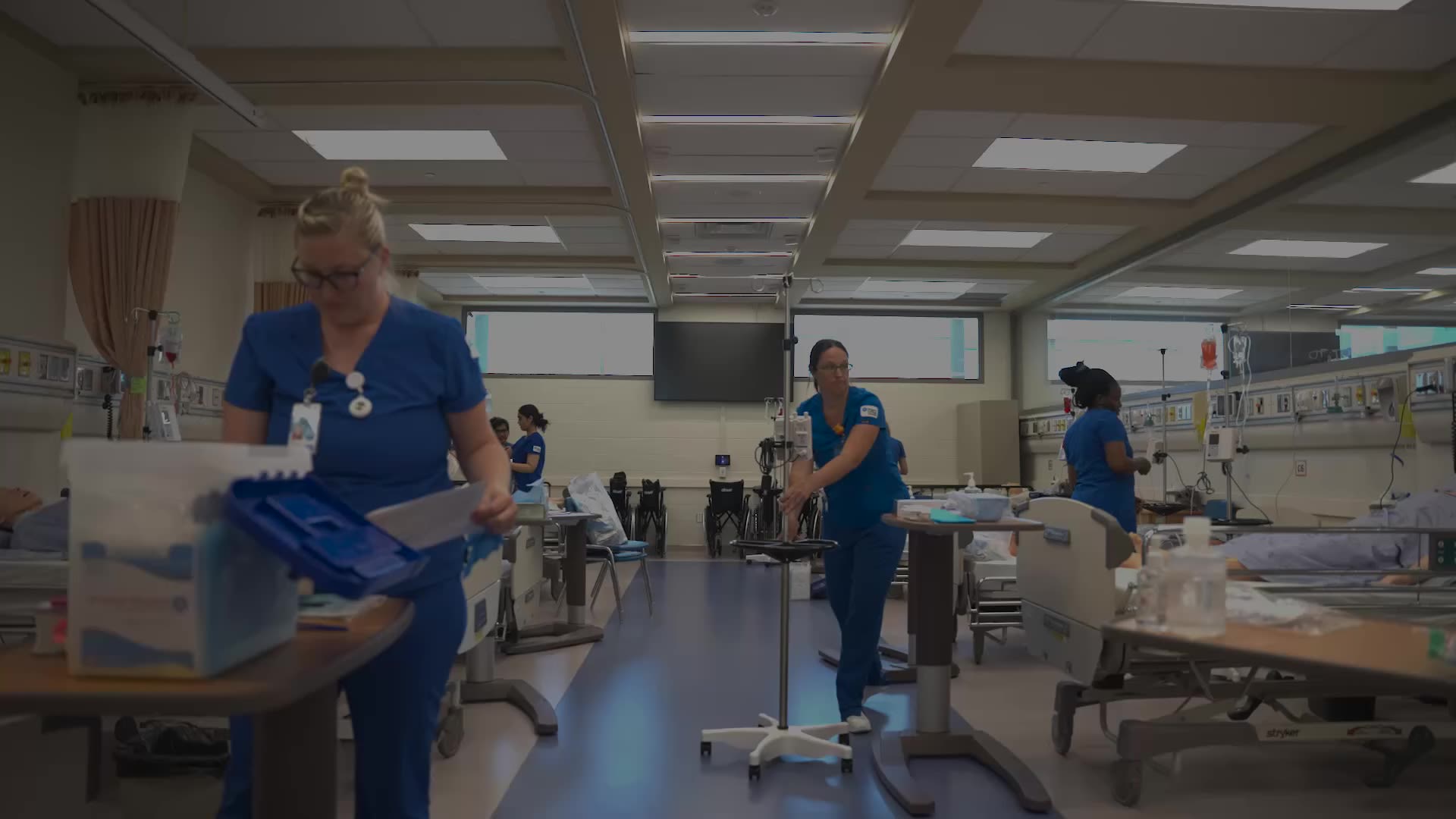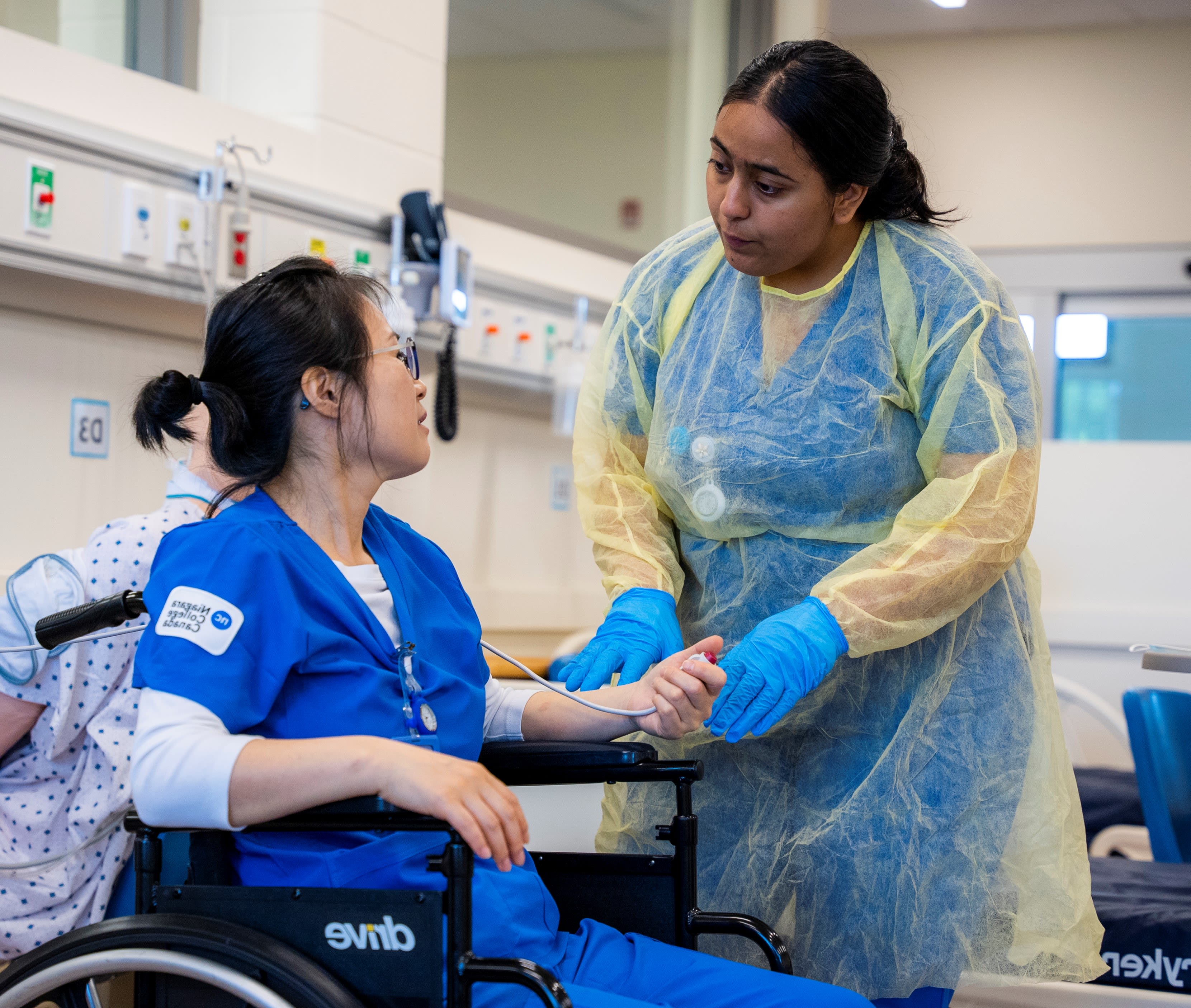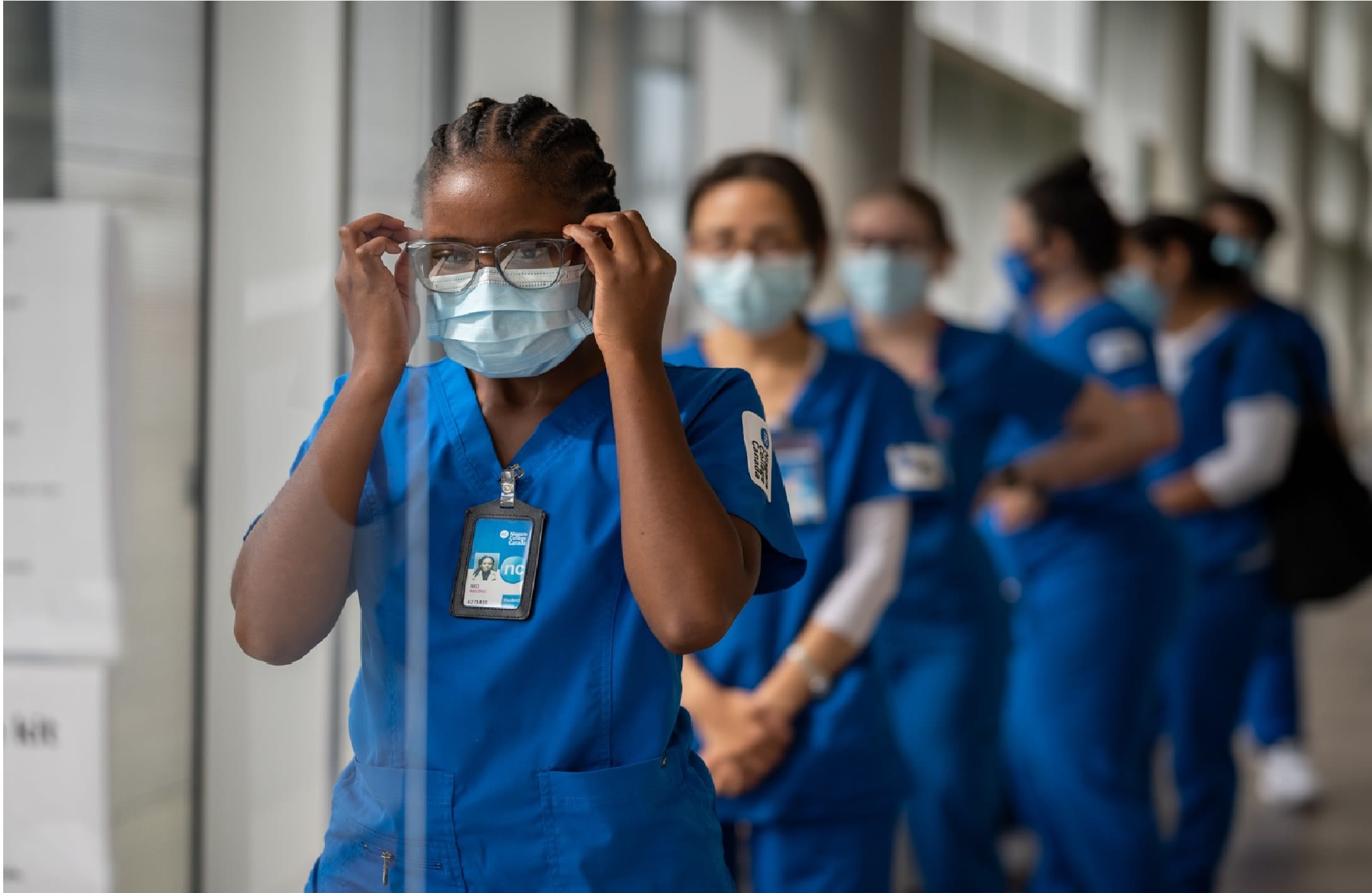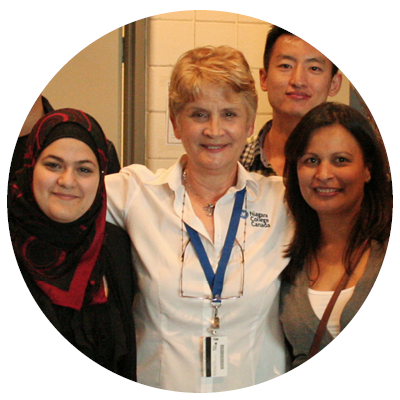Healthcare is community care.

As our community and province face a historic need for frontline healthcare workers like nurses and personal support workers, Niagara College, through its School of Nursing and Personal Support Work, is leading the way to train the next generation of caregivers.

Intensifying Healthcare Crisis
Ontario will be short 33,000 nurses and 50,000 personal support workers by 2032
An unprecedented healthcare crisis, caused by chronic staff shortages, increased demand, and insufficient funding, is threatening access to quality care for residents in Niagara and Ontario.
A Strong Legacy of Nursing Education
Niagara College is a leader in applied healthcare education
We have been at the forefront of applied nursing education for more than five decades, consistently pioneering innovations and adjusting to meet the evolving demands of the healthcare sector.
Sensible Solutions
Niagara College has a tangible plan to address the healthcare crisis in the immediate and foreseeable future.
We are dedicated to expanding our hands-on programs, enhancing our state-of-the-art facilities, supporting our students' overall experience, mental health and well-being, and investing in new tools and resources.
We Need Your Support
Help Niagara College address the healthcare crisis in the Niagara region.
Our nursing and personal support worker students are well prepared and ready to care for the sick and vulnerable, but they need more support. They need your support.
The Healthcare Crisis

Alarm bells are ringing as the healthcare sector in the Niagara region and Ontario faces an unprecedented crisis that threatens access to quality care for millions of people.
The COVID-19 pandemic highlighted the chronic shortages of nurses and personal support workers (PSWs) who provide essential services in hospitals, long-term care homes, and home care settings.
According to the Ontario Health Data Council, Ontario has the lowest ratio of inpatient staff to population in Canada, with 38% fewer full-time staff than the national average.
Stats Canada data indicates that hospital staffing levels have only increased by 0.4% since 2020. These overwhelming staff shortages are negatively impacting hospitals across the province and have led to more than 145 emergency room closures since 2022.
A provincial study reported that 50% of PSWs leave healthcare within five years, and 43% leave long-term care because of burnout. The shortage of PSWs in Ontario is at an all-time high, leaving vulnerable people without help and putting more pressure on those still working in the field.
These escalating trends present an imminent threat to both the stability of our healthcare infrastructure and the well-being of those it serves.
The time for decisive measures is NOW.
The crisis in Niagara’s hospital sector will only get worse over the next four years, unless significant investments are made to improve staffing and capacity.
Reduced access to quality care: With fewer skilled staff available, patients and residents experience longer wait times, delayed procedures, cancelled appointments, and overall lower standards of care. This can lead to negative health outcomes and increased complications.
These pressures are in addition to Niagara Region's declared state of emergency regarding mental health, homelessness, and addiction.
By 2042, one in every four Canadians will be a senior: The province estimates some 730,000 Ontario families currently require home care each year with about 60,000 workers helping that need annually. But there is currently a large shortfall.
By 2029, estimates show a 23% increase or additional 650,000 people in the over-65 population with those over the age of 75 growing by 27% or 350,000 people respectively.
Another 6,800 PSWs needed to accommodate an aging population likely to seek more home care over the next five years, according to researchers at McMaster University.
Sue VanderBent, CEO of Home Care Ontario, suggests it means about $411 million will need to be invested every year for three years to attract and retain home care staff to hold off a “seniors tsunami.”

DR. SINÉAD McELHONE
"In response to the healthcare crisis, Niagara College is committed to training students for essential front-line positions in various healthcare settings, including hospitals, clinics, nursing homes, community health centres, and home care."

LYNN GUERRIERO
"There is no bigger issue facing Ontario hospitals today than the serious shortage of healthcare workers. These challenges are unprecedented and something we will be dealing with for years to come."

SEAN
KENNEDY
“Niagara College nursing and personal support worker students will help meet the current and emerging needs of the healthcare workforce, particularly within southwestern Ontario communities and the province of Ontario."

Legacy of Nursing Education
Bridging Niagara College's rich history in nursing education with an exciting future.




MACK SCHOOL OF NURSING
Founded in 1874 by Dr. Theophilus Mack in St. Catharines, Ontario, The Mack School of Nursing was Canada’s first nursing school. It was inspired by the Florence Nightingale system of nursing education, which emphasized hygiene, medicine, and discipline. Nurses from London, England, came to Niagara to train the first class of graduates.
The school produced many nurses who worked primarily at the St. Catharines General Hospital and contributed to the advancement of the nursing profession.
The school changed its name to the Mack Centre of Nursing Education in 1969, and became part of Niagara College in 1973.
The Mack Alumni Association was the oldest active nursing alumni association in Canada until 2024. The association often celebrated the legacy of Mack graduates, dating back 150 years.
To honour the rich history and contributions of Mack graduates to the nursing profession, the Mack Alumni Association has established a nursing scholarship at Niagara College. This scholarship will serve as a lasting tribute by empowering future generations of nurses to uphold the esteemed legacy of Mack alumni who made a meaningful impact on healthcare.
TRAINING THE FRONTLINE
According to a 2021 report from the Registered Nurses’ Association of Ontario (RNAO), RNs and registered psychiatric nurses have had the largest increase in job vacancies over the past two years (up by 85.8%) of all measured occupations in Canada.
RN vacancies in Ontario more than quadrupled since the beginning of 2016 and more than doubled since the start of the Covid-19 pandemic. The number of RN vacancies that have remained unfilled for 90 days or more has increased by nearly 50% since the start of the pandemic.
Niagara College has expanded its program offerings to include Practical Nursing, Personal Support Worker, and the new Honours Bachelor of Science in Nursing, which launches in Fall 2024.
- Niagara College's nursing and personal support worker graduates play a vital role in meeting the healthcare needs of the Niagara region and beyond.
- They are trained to provide high-quality, compassionate, and evidence-based care to diverse populations across various settings.
- They also benefit from unique cross-professional education courses that enhance their collaboration skills as members of the healthcare team.
According to College data, 428 nursing and personal support worker students enrolled in 2023. The most recent graduate survey data shows that 90% of Practical Nursing graduates, and 100% of Personal Support Worker graduates obtained employment upon graduation.
An estimated 60 Bachelor of Science in Nursing graduates will commence studies in 2028, and are expected to obtain employment at similar volumes.
Each of these graduates is in high demand in the local labour market, as Niagara Health, the region's largest employer, relies on Niagara College for skilled and qualified employees.
In fact, Niagara Health hires many Niagara College nursing and personal support worker graduates, and an estimated 15% of hospital staff are NC alumni.
At Niagara College we are proud of the longstanding relationships with hospitals and community health agencies where our students gain hands-on experience with partner organizations.
NEW BScN PROGRAM
Niagara College’s new Honours Bachelor of Science in Nursing degree program, which launched in September 2024, is an exciting addition to our nursing education offerings.
The four-year program prepares students for work as registered nurses (RN), with a focus on primary healthcare. The program aims to increase the number of graduates over the next five years to help address the urgent demand for more registered nurses in Niagara and beyond.
- The degree combines theory and practice, with over 300 hours of hands-on experiential learning in state-of-the-art simulation labs.
- Students gain hundreds of hours of clinical placement experience in a variety of health care settings, culminating in a 14-week clinical capstone course.
- The focus is on global health and social justice, and emphasizes concepts and theories for understanding human responses in health and illness.
- Students gain additional transferable skills that include critical thinking, emotional intelligence, problem solving, and effective communication.
The program is designed with an emphasis on diversity, equity, inclusivity, and holistic care for aging adults, young children, young families and underserved populations, including those living in rural areas and those impacted by mental health and chronic health challenges.
“The Niagara College BScN program is unique in Ontario because the curriculum has a strong focus on social justice and global health issues, which prepares students to be world ready.” — Cindy Ko, PhD., Professor, School of Nursing and Personal Support Work

THE HON. REBECCA PATTERSON
"No matter where you go in the world, there is an absolutely insatiable thirst for education and access to healthcare … the aim of education and of healthcare is to create a better life."
Niagara College Nursing Graduate, 1987

ALLISON CRONKWRIGHT
“The professors spent countless hours invested in our education. The most validating thing was when I would be experiencing academic adversity and the profs took the time to remind me of how capable they believed I was. They truly believed I could do anything if I slowed down and stopped doubting myself. I can never thank them enough for their investment in my future.”
Practical Nursing, 2021, and Personal Support Worker, 2010, Graduate

BETTY ANN CHANDLER
"Many of the nurses in the Niagara region, I’ve taught at one time. All I ever wanted in my life was to be a nurse. When I went into teaching, all of a sudden I realized I was teaching young people what I love to do and what an honour it was to be able to teach."
Niagara College Nursing Graduate, 1985

Sensible Solutions
How Niagara College can help...

Recruiting more nursing and personal support worker cohorts
Niagara College will secure funding for scholarships and bursaries to help more students pursue their dreams by making college education more accessible to all.
Given the urgent need for health professions to fill thousands of vacancies, it is incumbent on Niagara College to ensure healthcare students are equipped with the skills and tools necessary to manage effectively, both during their student years and once they have entered the workforce.
To address the nursing shortages, Niagara College will increase intake to 90 students from 60, in addition to offering a 30 student cohort learning in the alternative delivery stream.
Supporting students in applied health programs
Niagara College will aim to decrease attrition and anxiety rates for students in applied health programs by increasing mental health and well-being supports.
Student attrition rates in Niagara College’s Applied Health programs (Practical Nursing, Personal Support Worker, and Paramedic) between first year and second year range from 26–52% (2021/2022). These numbers translate into fewer graduates and fewer candidates to fill the vast number of healthcare vacancies across the country.
Some measures that Niagara College will expand include:
- Offer early interventions and connections to address academic and social challenges, alleviating stressors and anxieties that lead to poor academic performance.
- Provide wraparound supports to help students feel engaged and supported.
- Ensure all students feel safe and secure knowing dedicated support is available to them to address issues as they arise.
Niagara College will also expand Critical Incidents Stress Management (CISM) resources that offer students interviews and debriefs with healthcare industry experts as they work through extremely challenging work placement situations (drug addiction, suicide, domestic violence, etc.).

Increasing lab spaces and upgrading equipment
Niagara College will purchase essential equipment, supplies, and technology to enhance the capacity and quality of education we provide, so that the next generation of caregivers are prepared to work in hospitals and long-term care homes.
More Labs and Spaces
Niagara College will:
- Build a new state-of-the-art Applied Health facility on the Welland Campus.
- Expand classrooms, labs, and learning spaces to accommodate larger cohorts.
- Offer community integrated teaching and learning opportunities.
New Partnerships and Equipment
Niagara College will:
- Create new partnerships with Niagara Health and other health care providers to expand student practicums.
- Increase virtual reality (VR) equipment to simulate professional situations that require students to navigate stressful workplace situations in a psychologically safe and controlled environment.

Staffing new hospitals with highly trained graduates
Niagara College will train and prepare graduates to fill critical roles at new local hospitals and facilities to provide care to the patients and residents.
New Hospital in Niagara Falls
The new South Niagara hospital, which broke ground in spring 2022, will be a state-of-the-art 12-storey building with 469 single patient rooms (an addition of 156 new beds), 8 operating suites, 42 hemodialysis stations and 2 MRI machines. It will offer a full scope of hospital services, including emergency, critical care, diagnostic, therapeutic and surgical services.
The hospital will serve as a regional centre for stroke, cardiac, and mental health services, as well as a teaching site for medical students and residents.
The project is expected to be completed in 2028, when the first new Niagara College cohort of Honour Bachelor of Science in Nursing will graduate.
New West Lincoln Hospital
The new West Lincoln hospital, which started construction in spring 2022, will be 80% larger than the current facility and include all single-patient rooms.
The redevelopment will feature a total of 55 beds, including 6 maternal rooms, and the emergency department, diagnostic imaging, complex continuing care, centralized outpatient services, acute in-patient care, maternal and day surgery with 4 new operating rooms, endoscopy, and ambulatory care.
The project is expected to be completed by 2025, when Niagara College's practical nursing and personal support worker students can begin staffing the new facility.

"The caliber of talent from Niagara College sets the bar extraordinarily high, and we’re grateful that many alumni choose to continue their professional healthcare journeys as valued members of our team at Niagara Health. We always hope the experience new nurses have with us will encourage them to want to come back once they graduate."
Heather Paterson,
Executive Vice-President, Clinical Operations, Niagara Health


We can't do this alone!
Join the comprehensive Niagara College fundraising campaign
and be part of a collaborative opportunity to enact transformative change.
On behalf of our students, and everyone at Niagara College, we thank you for your generous consideration of our proposal. We welcome the opportunity to discuss how you can positively contribute to our plans, and we are happy to answer your questions.

To learn more, connect with:
Gord Arbeau,
Vice President of Advancement
Shannon Boeckner,
Senior Director, Development & Donor Stewardship
For more information, visit niagaracollege.ca/together.






















